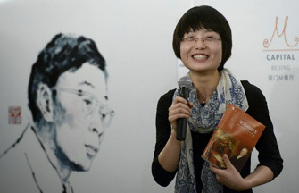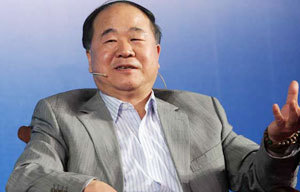There were about 200 journalists waiting for them on the runway ramps. But UN officials quickly ushered the delegation past them and into the terminal.
For the first few weeks, Shi felt like she was in a zoo.
"We were followed by everyone. Every day on the TV screen you could see the Chinese delegation," she says.
Reporters asked the same questions: Where have you been? What did you eat? Did you like American food?
"Actually, we didn't," says Shi, with a little laugh.
"We had never had any Western food, so it was strange for us. In the Chinese diet, at lunch or dinner we would have a soup. But there was no soup. Then we asked for soup, and they made a very good consomme of chicken soup. Otherwise, for vegetables, they just boiled them. Many of my colleagues were not used to it. Fortunately, they had brought some cans of Chinese pickles and sour cucumbers and chilies - that is how they survived!"
She was quickly learning how to deal with cultural challenges as she coped with language.
"One day there was a middle-aged lady who ran after me and asked, 'Are you from Red China?'" she recalls.
"I wasn't very happy, because I thought in her vocabulary "red" did not mean a very good thing - it mean revolutionary and violence and so on. But I saw her expression - it was very friendly - and so I said, 'Yes, but my country is called the People's Republic of China, not Red China'. And she said, "Oh it doesn't matter. Anyway, you are from China. That's good. It's overdue. Welcome to New York!"
Many Americans who lived through World War II welcomed her and her colleagues, recalling the days China and the US fought side-by-side.
"So this brought our two peoples closer," she says.
"One American man told me: 'You know, in my younger days in primary school, my teacher told me that if you want to go to China, dig a hole and, underneath, it's Shanghai.' Later president Reagan, when I accompanied him, told me the same story, and I told him: 'What a coincidence: We were told in primary school that if we dig a hole, we would reach New York'."
Being an interpreter in New York wasn't easy at first.
"I wasn't used to the American accent. We had been taught the Queen's English."
Translating over the phone, she says, required particular care.
"But I considered this my chance to study the language, because I never had the chance to study abroad. It was equivalent to going to university again. I could watch television. I took part in diplomatic talks and so on."
After president Richard Nixon's 1972 visit to China, China and the US began a secret compact in New York, she says, "because at that time we didn't have a visa office; we didn't have a permanent organization."
The Chinese would meet with Henry Kissinger, then the US national security adviser, in a two-story house on 43rd Street.
"The house was not decorated - no paintings or anything - just a few armchairs. It belonged to the CIA. Nobody knew what was happening there, but they were important talks."
Interpreting for Kissinger was difficult, she says, because of his strong, throaty voice and German accent.
|
 |
 |
| Translators act as bridge between China and France | Translators need to strike a balance |
|
|
|
|
|
|
|
|
